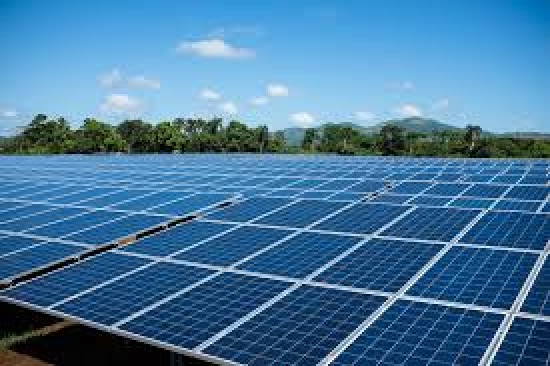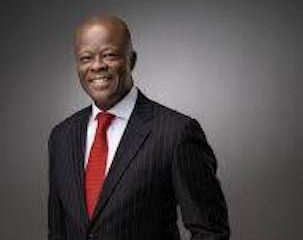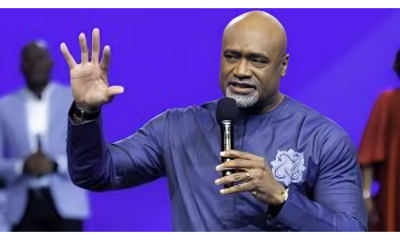NEWS
FEC Approves $26m for Power projects in Borno, Yobe, Adamawa

The Federal Executive Council (FEC) presided over by Vice-President Yemi Osinbajo on Wednesday approved about 26million dollars for various power projects in Borno, Yobe and Adamawa states.
Minister of Power, Sale Mamman, made this known to State House correspondents at the end of the Council meeting in Abuja.
He said the $1.
62million of the amount ($26m) was the payment of the claims and the variation of onshore and offshore cost of the existing contract for the construction of 1×1 50 MBA three 31, 32, 33 KV sub-stations at Damaturu and 1×330 KV land by extension at Gombi, Adamawa.He revealed that an additional N102.9million was approved for the affected project.
The minister also disclosed that the remaining $24.38million of the total approval was meant for the design, manufacturing and supply of four fabricated sub-stations of 2×100 MBA 132 33 KV power transformers with complete accessories for deployment to Damaturu, Potiskum, Biu, and Maiduguri.
He said: “Today, the Federal Executive Council has graciously approved two memos from the Federal Ministry of Power.
“One, it approved the payment of the claims and the variation of onshore and offshore cost of the existing contract for the construction of 1×1 50 MBA three 31, 32, 33 KV sub-stations at Damaturu and 1×330 KV land by extension at Gombi in favour Msssr Kadlak International Limited in the sum of $1,621,423.88 cents plus N102,905,606.07.
“The other one is the approval of the contract for the design, manufacturing and supply of four fabricated sub-stations of 2×100 MBA 132 33 KV power transformers with complete accessories for deployment to Damaturu, Potiskum, Biu, and Maiduguri for the Transmission Company of Nigeria (TCN) in favour of Msssr Kidon T Good Electric Company Limited and Incomtel Engineering Limited in the sum of $24,387,850.22 cents plus N1,475,204,584.34.
“Altogether, it is N10,730,393,742.82.’’
The Minister of Finance, Budget and National Planning, Dr Zainab Ahmed, also told the correspondents that the Federal Government had budgeted N396 billion for the provision of COVID-19 vaccine in the 2022 Appropriation.
She said: “Sometime in January, the President has, based on the request by the Ministry of Health, given in principle approval for the Ministry of Health to work with the Ministry of Finance, budget and National Planning to prepare and take to the National Assembly a supplementary budget for COVID-19 vaccination.
“The submission that was made to Mr. President at that time was in the sum of N399 billion, but included in this N399 billion was a N103 billion for building of primary healthcare centres.
“So we have worked with that and met several times with the ministry, we have agreed to back out from this building of primary health care centres, that can wait till later.
“So there is still a provision of 396 billion for COVID-19 vaccinations for 2021 and 2022.’’
The minister explained that the delay in the submission of the supplementary budget on COVID-19 was because the government wanted to confirm the vaccines donation that Nigeria was expecting from donors.
“There have been some delays because we expected the ministry to confirm the vaccines donation that Nigeria is expecting. We are expecting a total of not less than 43 million doses of vaccines.
“So they are supposed to find out when those ones will come. Because, if we are going to get back the donated vaccines, and at the speed of the current rollout, we have to slow down on what we are buying ourselves.
“So the ministry is working with partners that are donating these vaccines.
“We see the timelines of the donations and see the gap that the government needs to fill in 2021, but we have already provided to the ministry funds to enable them roll out the four million vaccines that have been brought already into the country, and the vaccination process is ongoing.
“So for us, it is still work in progress. We hope in the next couple of days, we will have clarity on the schedule of vaccines expected from donors, and then we will now be able to firm up what government has to provide for in 2021. And therefore the 2021 component we will provide it during the 2022 appropriations.”
It would be recalled that President Muhammadu Buhari and the leadership of the National Assembly led by the Senate President, Dr Ahmad Lawan and the Speaker of the House of Representatives, Femi Gbajabiamila met on Tuesday and agreed on supplementary budget for COVID19 vaccination and procurement of military hardware. (NAN)
NEWS
DHQ Rebuts Allegation of Internal Sabotage in Benue Massacre

The Defence Headquarters (DHQ) has dismissed the allegation suggesting that internal sabotage within the Nigerian military contributed to the tragic events in Yelwata, Benue.The Director of Defence Information, Brig.-Gen. Tukur Gusau, in a statement on Tuesday, said the claims were unfounded and not supported by credible evidence.
Gusau said the Nigerian military had consistently denied any involvement in the massacre. According to him, the Chief of Defence Staff (CDS), Gen. Christopher Musa, has publicly stated that the military was not responsible for the killings in Yelwata.“Furthermore, the Nigerian Military has emphasized its commitment to protecting civilians and upholding the rule of law.“There is no credible evidence to substantiate claims of internal sabotage within the military related to the Yelwata incident.“Investigations by independent bodies, including human rights organizations, have not found any links between the military and the perpetrators of the massacre.“The violence in Yelwata is part of a broader pattern of intercommunal clashes in Nigeria’s Middle Belt region, primarily between farmers and herders.“These conflicts are driven by longstanding disputes over land and grazing rights, ethnic tensions, and competition for resources,” he said.Gusau said that while the military had been deployed to maintain peace, the root causes of the violence lied in complex socio-economic and political factors.He added that attributing the Yelwata massacre to internal sabotage within the Nigerian military was misleading and detracts from the real issues at play.According to him, it is essential to focus on addressing the underlying causes of intercommunal violence and to support efforts aimed at fostering dialogue, reconciliation, and sustainable peace in the affected regions.“The CDS has only called for a holistic approach and the need for the cummunities and the security agencies to work closer to address the issue.“He also call on the communities not to hide criminals and also assure them the military ans other security agencies are there to protect lives and properties of law abiding citizens,” he added. (NAN)NEWS
Benue killing: NAF Deploys More Air Assets in Op Whirl Stroke

As part of sustained efforts to restore peace and stability across the North Central region, the Nigerian Air Force (NAF) has deployed additional air assets under Operation Whirl Stroke (OPWS).This is contained in a statement by the Director, Public Relations and Information, NAF, Air Commodore Ehimen Ejodame, on Tuesday in Abuja.
Ejodame said the strategic move had reinforced the NAF’s commitment to enhancing security, supporting ground operations, and reassuring communities affected by banditry, kidnapping, and communal unrest. He said the Chief of the Air Staff (CAS), Air Marshal Hasan Abubakar, conducted a firsthand evaluation of air operations under OPWS, to assess the effectiveness of these expanded efforts.According to him, the visit included a high-level strategic engagement held on Tuesday, at the Headquarters Tactical Air Command, Makurdi.Ejodame said the Chief of Army Staff, Lt.-Gen. Olufemi Oluyede; a representative of the Chief of the Naval Staff, Rear Adm. Olusegun Ferreira; the Commander of OPWS; and the Maritime and Air Component Commanders, alongside other key stakeholders, were part of the meeting.According to Ejodame, critical updates were provided on the current tempo of joint operations aimed at restoring lasting peace across the region.In his remarks, the CAS revealed that the newly deployed air assets had been successfully integrated into ongoing operations, delivering real-time intelligence and precision targeting support.He stated NAF aircraft had continued to conduct surveillance, armed reconnaissance, close air support, and precision strike missions with remarkable success.Abubakar noted that the current deployment aligns with the Federal Government’s overarching mission to stabilise the Middle Belt region.He highlighted the impact of recent coordinated air and ground operations across Benue, Nasarawa, and Taraba States, which have led to the dismantling of several militia camps, bandit enclaves, and criminal hideouts.“These outcomes reinforce our unwavering commitment to protecting innocent lives and supporting national peace-building initiatives.“As long as peace is threatened, our resolve remains unshaken.“The NAF will continue to deliver timely, decisive air support in synergy with sister services, ensuring the protection of lives and properties while advancing our mission of restoring peace to the Middle Belt and beyond,” he said.The Service Chiefs jointly emphasised the importance of synergy among the armed forces and other security agencies, noting that jointness remains a cornerstone for operational success under Operation Whirl Stroke.They reiterated that the ongoing operations are part of a broader goal to create a secure environment where residents can live and conduct their legitimate activities without fear. (NAN)NEWS
Tinubu Reiterates Commitment to Fast-Track Approvals for Viable Projects

President Bola Tinubu, on Tuesday restated the determination of his administration to fast-track approvals for viable infrastructural projects in the country.Tinubu, represented by Vice President Kashim Shettima, made this known at the 2025 Nigeria Public-Private Partnership (PPP) Summit on Tuesday in Abuja.
The president therefore urged private sector partner to be focused and more committed. According to him, what matters to the average Nigerian is the availability of basic infrastructure such as power, roads, health facilities and quality schools. He called for a more strengthened public-private sector partnership that emphasises innovation, efficiency, commitment and integrity above mere capital and investments.” We need more than investment. We need innovation, we need efficiency, and above all, we need integrity.” I urge you to look beyond the risks and recognise the immense opportunity to shape a nation that is not just rising, but ready.“The projects that emerge from this summit must not gather dust on paper or linger in bureaucratic limbo.” We will fast-track approvals for viable projects. We will ensure coordination across Ministries, Departments, and Agencies to enable swift implementation.“We do this because we know that what matters to the average Nigerian is not promises, but power in their homes, roads to their farms, access to clean water, modern hospitals, and quality schools. We must build.” We must deliver. And we must do it together,” he said.He observed that a 21st-century economy cannot be built on 20th-century infrastructure, pointing out that the “old model of public-only infrastructure funding is no longer sustainable.“Our national aspirations far exceed what public budgets alone can deliver. That is why we must innovate, and why we must work together.” We are not looking for investors to carry burdens. We are offering opportunities to create value.” We seek long-term partners who are ready to help us bridge our infrastructure gap with purpose and precision,” he added.Tinubu recalled that his administration, on assumption of office two years ago, was quite aware “that a functional relationship between the public and private sectors would be the magic wand of transformation.”He reaffirmed that the administration was still fully committed to that very public-private partnership that is passionate about delivering sustainable and inclusive infrastructure.” We have strengthened the Infrastructure Concession Regulatory Commission and enhanced its capacity to regulate, superintend, and de-risk PPP transactions.” We are determined to deliver infrastructure that is both sustainable and inclusive. Our economic reforms have laid a stable foundation.” From the removal of unsustainable subsidies to the liberalisation of the foreign exchange regime and the optimisation of government revenues, we have acted boldly and responsibly.“We are streamlining bureaucratic bottlenecks and improving transparency in our project pipelines.” We have aligned our processes with global best practices and investor expectations.”The President urged participants to ensure the event is “remembered not for fine speeches, but for bankable projects, signed deals, and enduring progress.”The Minister of Interior, Mr Tunji Ojo, commended the ICRC for championing game-changing projects across diverse sectors.Ojo noted that with President Tinubu and Vice-President Shettima in the saddle, Nigeria is taking its rightful place in the comity of nations.The Regional Director, Central Africa and Anglophone West Africa, IFC, Dahlia Khalifa, applauded the ongoing reform in Nigeria’s PPP framework.Khalifa acknowledged IFC’s collaboration with authorities across key sectors to achieve the country’s overall objectives and strengthening the existing relationship between the organisation and Nigeria.She added that Nigeria under President Tinubu has demonstrated strong commitments to timely and transparent resolution of disputes arising from PPP projects.Solomon Quaynor, the Vice President for Private Sector, Infrastructure and Industrialisation at the African Development Bank, said the theme of the summit implies that partnerships are not just optional but are essential.He said the infrastructure deficits “demand that the government and the private sector work together in commercially viable PPPs.”Quaynor added that the bank was working with other partners on the Lagos-Abidjan highway project to boost regional economic integration in West Africa.“PPPs are complex long-term projects. They need to be designed properly and designed to survive different political administrations because by their very nature, they are long-term,” he stated. (NAN)




























